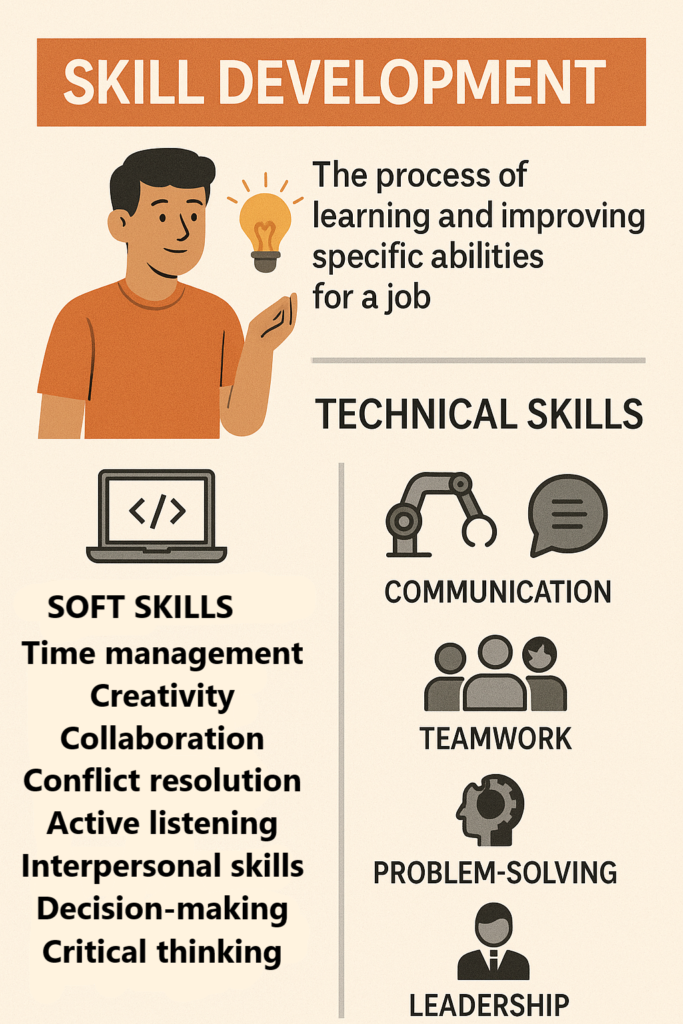What is Skill Development?
Skill development refers to the process of learning and improving specific abilities and knowledge required to perform a job. In simpler terms, it means learning new things and becoming better at tasks that are needed in the workplace. These skills can be technical (like how to use a computer or machinery) or soft skills (like communication, leadership, and problem-solving).

Why is Skill Development Important for India?
India has a large population, with millions of young people entering the workforce every year. However, there is often a gap between the skills that young people have and the skills that employers need. Here’s why skill development is so important for India:
- Improving Employability: Many young people in India, especially in rural areas, lack the skills that are required by modern industries. This makes it hard for them to find good jobs. By improving their skills, they become more employable and can find better job opportunities, leading to a more stable and successful career.
- Boosting Economic Growth: When people have the right skills, they can work more effectively and efficiently, which helps businesses grow. A skilled workforce leads to increased productivity, which is a key factor in economic growth. For example, workers with skills in technology or manufacturing can help businesses innovate and compete globally.
- Meeting Industry Demands: As industries like technology, healthcare, renewable energy, and manufacturing grow in India, there is an increasing demand for workers with specialized skills. Without proper skill development, there will be a shortage of qualified workers, which can slow down the growth of these industries.
- Reducing Unemployment: Skill development can directly address unemployment. By training young people with skills that match the needs of the job market, the chances of them finding a job increase. This helps reduce the number of unemployed people and improves the country’s overall economic health.
- Fostering Entrepreneurship: Skill development doesn’t just help people find jobs; it also encourages them to create their own businesses. With the right skills, people can start their own companies, hire employees, and contribute to job creation in India. This is especially important in a country where small and medium-sized businesses play a key role in the economy.
Types of Skills Needed for India’s Workforce
India needs workers with both technical and non-technical (soft) skills. Here’s a breakdown of the types of skills:
- Technical Skills: These are specific skills required for particular jobs. Examples include:
- Computer programming (for IT jobs)
- Mechanical engineering (for manufacturing jobs)
- Nursing (for healthcare jobs)
- Data analysis (for business and finance jobs)
- Soft Skills: These are general skills that help people work well with others. Examples include:
- Communication: Being able to speak and write clearly.
- Teamwork: Working well with others.
- Problem-solving: Finding solutions to challenges.
- Leadership: Being able to guide and motivate others.
Benefits of Skill Development for India’s Workforce
- Higher Income: Skilled workers can earn higher salaries because their abilities are in demand. For example, a software engineer with advanced programming skills can earn much more than someone without those skills. Higher wages also help improve the standard of living.
- Better Job Security: In a competitive job market, people with specialized skills are more likely to keep their jobs and be promoted. Employers value employees who can do their jobs well and adapt to changing technologies or industry demands.
- Improved Quality of Work: When workers are skilled, they can do their jobs more efficiently and with better quality. This not only benefits the workers but also helps the company or industry grow and stay competitive.
- Fewer Skill Gaps: By focusing on skill development, India can ensure that there are fewer gaps between what the job market needs and what workers can offer. This means businesses can find skilled workers more easily, and young people will have better chances of finding employment.
How is India Addressing Skill Development?
India is already taking several steps to improve skill development among its workforce:
- Pradhan Mantri Kaushal Vikas Yojana (PMKVY): The PMKVY is a government scheme aimed at providing training to youth in skills that are in demand in the market. This scheme offers training in areas like construction, IT, healthcare, and electronics.
- National Skill Development Mission: The government launched this mission to create a large pool of skilled workers in India. It involves partnerships with various training organizations to improve the skills of workers in industries like agriculture, manufacturing, and services.
- Vocational Training: In India, there are many programs that offer vocational training to help people learn practical skills for specific jobs. These include programs for plumbers, electricians, beauticians, and mechanics.
- Skill Development Centers: Many centers and institutes in India focus on providing training in specific skills. These institutes provide short-term and long-term courses to help workers enhance their knowledge and skills in areas like engineering, design, and business management.
Challenges to Skill Development in India
Despite the progress, India faces some challenges in skill development:
- Lack of Infrastructure: In rural areas, there are not enough training centers or resources to teach skills to young people.
- Awareness: Many people are not aware of the opportunities for skill development, especially in rural regions.
- Mismatch of Skills: Sometimes, the skills being taught do not match the actual needs of the industries or employers, making it harder for people to find work after training.
Conclusion
Skill development is essential for India’s workforce to keep up with the changing needs of industries, improve employability, and help reduce unemployment. By investing in both technical skills (like computer programming or healthcare) and soft skills (like communication and teamwork), India can create a more competitive and productive workforce. Improving skills helps people earn better incomes, find more secure jobs, and contribute to the overall growth of the economy. Through government programs and partnerships with businesses, India is making progress in addressing these issues, but more needs to be done to bridge the skill gap and ensure that all young people are equipped with the right skills for the jobs of tomorrow.







